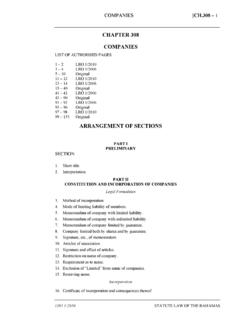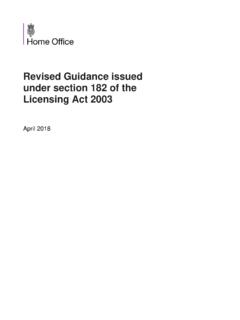Transcription of RTFO guidance part 1: process guidance year 2021 - GOV.UK
1 Version 2021, January 2021 RTFO guidance part One process guidance 2021: 01/01/21 to 31/12/2021 Moving Britain Ahead The Department for Transport has actively considered the needs of blind and partially sighted people in accessing this document. The text will be made available in full on the Department's website. The text may be freely downloaded and translated by individuals or organisations for conversion into other accessible formats. If you have other needs in this regard please contact the Department. Department for Transport Great Minster House 33 Horseferry Road London SW1P 4DR Telephone 0300 330 3000 General enquiries Website Crown copyright 2021 Copyright in the typographical arrangement rests with the Crown. You may re-use this information (not including logos or third-party material) free of charge in any format or medium, under the terms of the Open Government Licence To view this licence visit or write to the Information Policy Team, The National Archives, Kew, London TW9 4DU, or e-mail: Where we have identified any third-party copyright information you will need to obtain permission from the copyright holders concerned.
2 V 2021, January 2021 3 Contents Executive summary 5 The Renewable Transport Fuel Obligation 5 meeting the obligation 6 Reward for wastes, residues, dedicated energy crops and RFNBOs 7 Accounts and claiming certificates 7 Penalties for non-compliance 8 1. Accounts 9 Requirement to register with the Administrator 9 Penalties for failure to open an account 10 Fuels covered by the RTFO Order 10 Assessment time for fuels with no currently defined duty point 11 Applying for an account 13 Account refusal 16 Changing information concerning an account 16 Penalties for failure to maintain correct details 16 Account closure 17 Reinstating a closed account 17 Managing users on an account 17 Consolidating an account 18 2. Obligation 19 Minimum threshold 19 Obligation periods 19 Calculation of the obligation 19 The crop cap 21 Development fuel target 23 3.
3 Defining categories of renewable fuel 26 Renewable fuel categories 26 Biofuels 27 Partially renewable biofuels 27 Renewable fuels of non-biological origin (RFNBOs) 33 V 2021, January 2021 4 part RFNBO, part non-RFNBO fuels 34 Use of gas pipelines for distribution of biomethane or other renewable gases 35 fuel volumes38 What to submit 38 Determining the end use of gas oil 40 How the Administrator validates supplier submissions 41 Additives 41 Energy content 42 Reporting timetable 44 Transport Fuel Certificates47 Which fuels are eligible for RTFCs47 Requirements before an application for RTFCs can be made47 Joint applications for RTFCs and GHG creditsTimeline for applications48 Flow of information before and during the application process51 How an application will be assessed51 How RTFCs will be issued52 Rounding of volumes to which RTFCs are issued53 Identification and 'carry over' of RTFCs54 Transferring RTFCs from one account to another55 Revocation of RTFCs56 making representations against a revocation proposal
4 Or decision57 Applying for RTFCs for fuel that has had RTFCs revoked58 Links from RTFC revocation to civil penalties58 Obligation status of renewable fuel for which RTFCs have been revoked58 the obligation60 penalties62 Communicating civil penalty notices63 Amount of civil penalties63 Objections to civil penalties63 Appeals to civil penalties63 Unpaid civil penalties63 Annex A: Sustainability compliance policy 65 Introduction 65 Assessing applications for RTFCs 65 V 2021, January 2021 5 Executive summary This document is the process guidance for reporting under the Renewable Transport Fuel Obligations Order 2007 No. 3072 ('the RTFO Order'), as amended. The aim is to provide suppliers with information on how to comply with the RTFO Order and practical instruction on how to submit the required information to the Administrator.
5 This document provides detailed instructions and information on: the obligation that the RTFO Order puts on certain fuel suppliers; applying for and maintaining an account with the RTFO Administrator; applying for Renewable Transport Fuel Certificates (RTFCs); penalties for non-compliance; and, the Administrator's sustainability compliance policy. The Renewable Transport Fuel Obligation The Renewable Transport Fuel Obligation (RTFO) is one of the Government's main policies for reducing greenhouse gas emissions from fuel supplied for use in: (i) road vehicles, and (ii) non-road mobile machinery (including inland waterway vessels which do not normally operate at sea), tractors, and recreational craft that do not normally operate at sea (termed 'road' and 'NRMM' respectively through the rest of this document). From 15 April 2018, renewable fuel used in aviation in the UK is also eligible for reward under the RTFO, although fossil aviation fuel is not obligated1.
6 The RTFO commenced on 15 April 2008 and is intended to deliver reductions in greenhouse gas emissions from fuel used for transport purposes by encouraging the supply of renewable fuels. The RTFO Order was amended regarding the following aspects: For fuel supplied from 15 December 2011 to implement the transport elements of Directive 2009/28/EC of the European Parliament and of the Council of 23 April 2009 on the promotion of the use of energy from renewable sources (the 'EU Renewable Energy Directive (RED)') which requires that renewable fuel passes sustainability criteria before being rewarded under the RTFO. On 8 April 2013 to make express provision that a civil penalty issued under the RTFO Order can be recovered as a civil debt, together with interest at a specified level. This change applies to civil penalties issued on or after that date.
7 Initially the RTFO Order only covered suppliers of fuel for use in road vehicles. The RTFO Order was amended for fuel supplied from 15 April 2013 to cover suppliers of fuel for use in NRMM. To ensure that the overall amount of biofuel 1 Note that renewable aviation fuels that do not meet the sustainability criteria will not receive a reward and will be subject to an obligation under the RTFO. V 2021, January 2021 6 supplied in the UK for transport purposes remained the same, despite expanding the scope of the RTFO Order to cover suppliers of fuel for use in NRMM, an amendment was made to the 'specified amount' in Article 4 of the RTFO Order so as to slightly lower the obligation level. The RTFO Order was amended on 15 April 2015, including to increase the reward for certain renewable gaseous transport fuels, to align the treatment of hydrotreated vegetable (HVO) oil and fatty-acid-methyl-ester (FAME), and to clarify the approach to rounding of RTFCs and fuel volumes.
8 From April 2018 the RTFO Order was amended to implement elements of Directive 2015/15132 (known as the 'Indirect Land Use Change (ILUC) Directive'), which amends the RED. These elements include: updated GHG savings thresholds for renewable fuels; a requirement for Member States to report on ILUC values for land-based (crop) biofuels; and introduction of definitions for wastes and residues. A definition for dedicated energy crops is also provided. The 2018 amendments also introduced a crop cap for year 11 of the RTFO (from 15 April 2018) and a target for a specific sub-set of advanced fuels termed 'development fuels' was introduced in 2019 from 1 January 2019. In addition, renewable fuel volume targets are set out to 2032 and beyond, and several new fuel types are made eligible for support under the RTFO including aviation fuel, hydrogen and other RFNBOs.
9 Under the RTFO Order, transport fuel suppliers have an obligation to provide a volume of sustainable renewable fuel which is calculated as a proportion of the overall volume of fuel they supply for road transport and NRMM purposes. This guidance sets out who is obligated and how they should comply with that obligation. meeting the obligation Suppliers of road and NRMM fuel supplying petrol, diesel, gas oil or renewable fuel totalling 450,000 litres or more in an obligation period have an obligation under the Order. Obligated suppliers may meet their obligation by redeeming Renewable Transport Fuel Certificates (RTFCs) or by paying a fixed sum for each litre of fuel for which they wish to 'buy-out' of their obligation. RTFCs are gained by supplying sustainable renewable fuels. Those wishing to apply for RTFCs must have an account with the Administrator.
10 One certificate may be claimed for every litre of sustainable renewable fuel supplied3. Fuel from certain wastes or residues, fuel from dedicated energy crops, and RFNBOs are incentivised by awarding double the RTFCs per litre or kilogram supplied. Data on the sustainability of fuel supplied must be independently verified before certificates will be awarded and the Administrator may require the evidence behind an application to be provided. RTFCs may be traded on the open market. Any supplier of renewable fuels who owns the fuel at the 'duty point' or alternative assessment time may apply to receive RTFCs, regardless of whether or not they have an obligation under the Order. 2 Directive (EU) 2015/1513 of the European Parliament and of the Council of 9 September 2015 amending Directive 98/70/EC relating to the quality of petrol and diesel fuels and amending Directive 2009/28/EC on the promotion of the use of energy from renewable sources.
















